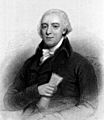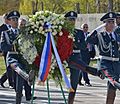Police facts for kids
Police are a group of people whose main job is to make sure everyone follows the law. They also help during emergencies, solve crimes, and keep people and their belongings safe. People who work for the police are called police officers or policemen. They usually work from a building called a police station. Police officers are often trained in first aid and rescue skills. This is because they are often the first to arrive when someone is sick or injured, like after a car accident or a fire.
The word police came into English from French in the 1700s. For a long time, people in the UK didn't like the idea of police. They thought it was a sign of control from other countries. But by the 1800s, things changed. The first official use of the word police in UK government papers was in 1714 for police in Scotland. Later, the Marine Police was created in 1798 to patrol the river.
The very first official police force in the world was probably the High Constables of Edinburgh. They were formed in 1611 to keep order on the streets of Edinburgh, which was then part of the Kingdom of Scotland.
Contents
History of Police
Ancient Times
Even in ancient Egypt, there were people who enforced laws. During the Old Kingdom period, warriors with wooden sticks guarded public places like markets and temples. They also caught criminals. These ancient police even used trained monkeys, baboons, and dogs to help them guard and catch people. Later, in the Middle Kingdom period, a professional police force was created. These officers made sure that punishments given by judges were carried out. There were also special police units who were priests. Their job was to guard temples and tombs and make sure religious events were done correctly.
In ancient Greece, slaves owned by the public worked for judges as police officers.
The Roman Empire used its army to keep things safe. Roman soldiers would be sent to live among regular people to do law enforcement jobs. The Praetorian Guard was a special army group. They mainly protected the emperor and gathered information. But they could also act like riot police if needed. In those days, if someone was a victim of a crime, they or their family had to find and prosecute the criminal themselves.
When Augustus was emperor, the city of Rome grew very large. It had almost a million people! So, 14 areas were created in the city. Each area was protected by a group of 1,000 men called vigiles. These vigiles were like night watchmen and firefighters. Besides putting out fires, they also caught small criminals, found runaway slaves, guarded bathhouses at night, and stopped public disturbances.
Even before Europeans arrived, civilizations in the Americas had organized law enforcement. The Maya city-states had constables called tupils. In the Aztec Empire, judges had officers who could arrest people, even important ones. The Inca Empire had officials called curaca who enforced laws in the homes they watched over. There were also inspectors called tokoyrikoq (meaning "he who sees all") who kept order throughout the provinces.
Police Powers
Police officers have special powers to help them do their job. These powers can be different depending on the country. Most police officers can arrest people, search people, and search houses or other properties. They sometimes carry equipment like guns, batons (a type of club), and pepper spray. The area where a police officer can use these powers is called their jurisdiction. If an officer goes outside their jurisdiction, they cannot use their powers anymore. Another police force would then have to take over.
Police Duties
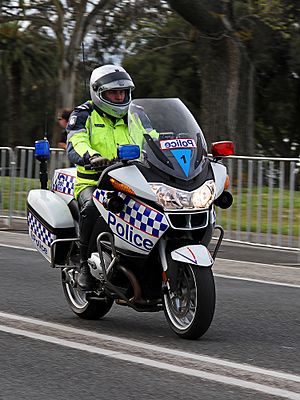
Police officers have many important duties:
- Stopping crime and protecting people: They do this by patrolling on foot in their uniforms or in police cars. Many people believe that seeing police officers around makes them feel safer. It also helps prevent some types of criminal behavior.
- Investigating crime: This means they find out who committed a crime. Some serious crimes, like robbery or murder, are investigated by special officers called detectives.
- Helping in emergencies: Police also help with problems that are not crimes. They go to car accidents, fires, or help people who are sick or hurt. Police work closely with firefighters, ambulances, and rescue teams. They might also direct traffic, help lost children, give traffic tickets, and do many other helpful things.
Parts of Police Departments
Most police departments have two main groups of officers:
- Patrol officers: These officers wear uniforms and travel through their assigned areas to see what is happening. They drive marked cars with warning lights and sirens (which make loud sounds to warn people). Patrol officers also make sure traffic regulations are followed and sometimes manage local jails.
- Detectives: These officers usually wear regular clothes. They work on more complicated investigations.
The names for these groups can be different in various countries. For example, in the United Kingdom, patrol officers are part of the "uniform branch." Detectives work in the "Criminal Investigation Department" (CID). Police uniforms, equipment, and methods can vary a lot from one country to another. In some places, special police groups are trained for specific jobs, like dealing with riots or very dangerous situations.
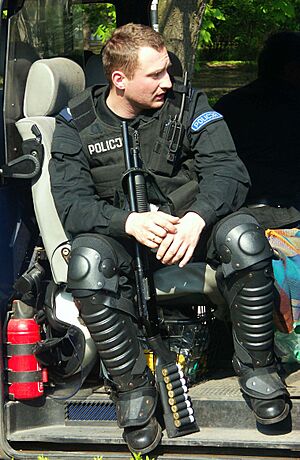
Police Around the World
Police forces have different names in different countries. In Ireland, they are called the Garda. In Russia, they were called the Militsiyer until 2012, but now they are called the Politsiyer, which is closer to the English "police." Other names for police services include sheriff's office, marshal's office, or department of public safety.
Within the same country, there can be different types of police officers. They might have powers in different areas or situations. Examples include state police, military police, and local police. Around the world, police officers make up a small part of the population they serve. On average, there are about 303 police officers for every 100,000 people.
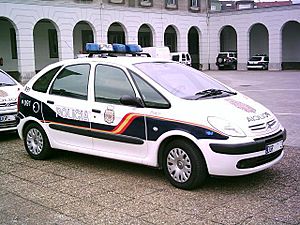
Police Equipment
In most countries, police officers are trained to carry guns. Even in countries like the United Kingdom, New Zealand, and the Republic of Ireland, where most police officers do not carry guns, more are being trained to do so. This is often because gun crime is becoming more common. Firearms training teaches that a gun should only be used when lives are in danger.
Related pages
Images for kids
-
The Santas Hermandades of medieval Spain protected pilgrims on the Camino de Santiago.
-
Patrick Colquhoun, who founded the Thames River Police.
-
A poster against police in Aberystwyth, Wales, from April 1850.
-
A "Peeler" (early police officer) of the Metropolitan Police Service in the 1850s.
-
A group photo of policemen in Bury St Edmunds, Suffolk, England, around 1900.
-
Finnish police officers watching a parade for Helsinki's 400th anniversary in 1950.
-
Policemen on patrol in a Greater Chennai Police car in India.
-
A Deputy U.S. Marshal covering fellow officers during a "knock-and-announce" procedure.
-
Jeremy Bentham, a philosopher who supported having police forces to prevent crime.
-
Uniformed police officers of the West Midlands Police in the United Kingdom.
-
An unmarked police car used by detectives or officers in Sydney, Australia.
-
SWAT team members in the United States.
-
A police car in Utrecht, Netherlands.
-
A General Directorate of Security riot control officer during protests in Gezi Park protests, Turkey.
See also
 In Spanish: Policía para niños
In Spanish: Policía para niños
 | Delilah Pierce |
 | Gordon Parks |
 | Augusta Savage |
 | Charles Ethan Porter |






